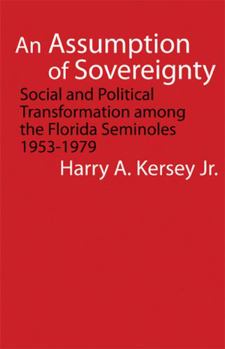An Assumption of Sovereignty: Social and Political Transformation Among the Florida Seminoles, 1953-1979
Select Format
Select Condition 
Book Overview
In the early 1950s the very existence of the Florida Seminoles was in jeopardy. Mired in poverty, poorly educated, underemployed, and without a tribal government, they also faced the possibility that the U.S. Congress would terminate services to them. Fortunately, loss of reservation lands was averted and the situation began to improve. When the federal government approved a charter and constitution for the tribe in 1957, it marked both the official resumption of tribal sovereignty after more than a century and the first agreement that did not force removal of the Seminoles from the reservation. An Assumption of Sovereignty continues Harry A. Kersey Jr.'s examination of Seminole history. He studies the effects of shifting governmental attitudes and policies on the Florida Indians during the past quarter-century. He also charts the social, economic, and political experiences of the tribe during these volatile decades. By the end of the account, readers understand that the Seminole tribe has become organized, functioning, and sovereign, with a stable economic base. The author has made extensive use of oral history from tribal elders as well as the memoirs and records of Florida congressional leaders. Harry A. Kersey Jr. is a professor of history at Florida Atlantic University. He is the author of The Florida Seminole and the New Deal, The Seminole and Miccosukee Tribes: A Critical Bibliography, and Pelts, Plumes, and Hides: White Traders among the Seminole Indians, 1870-1930.
Format:Paperback
Language:English
ISBN:0803222491
ISBN13:9780803222496
Release Date:September 2007
Publisher:University of Nebraska Press
Length:290 Pages
Weight:1.14 lbs.
Dimensions:0.6" x 6.0" x 9.0"
Customer Reviews
0 rating





